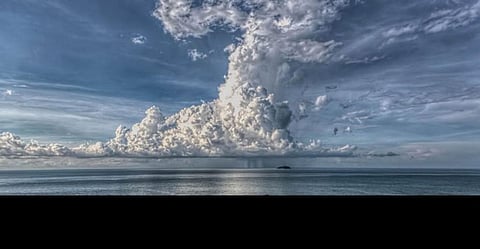

The event is a part of the 2022 United Nations Ocean Conference, which is being held in Lisbon from June 27-July 1, 2022.
“The ocean is still too often in the blind spot of public awareness and public policies. We do not understand it, and we do not protect it sufficiently. It is urgent that we reverse this trend,” she added.
Azoulay urged the international community to redouble its efforts “to better understand and protect the oceans”.
“The ocean connects us all. Sadly, we have taken the ocean for granted, and today we face what I would call an ‘Ocean Emergency’,” UN Secretary-General António Guterres said at the high-level opening meeting in Lisbon.
At the conference, Alliance members highlighted the ocean’s role in regulating the climate and how human activities have impacted them
They also stressed the need to act on plastic pollution as well as illegal, unreported and unregulated fishing to protect marine ecosystems and coastal communities.
India aims to protect 30 per cent of its land, water and ocean by 2030, said Jitendra Singh, Union minister of state for earth sciences as well as science and technology
“India has proposed to establish a Sustainable Coastal and Ocean Research Institute to meet the needs and aspirations of pacific island countries,” he added.
He also reiterated that the country is committed to establishing a clean coastal campaign. He added that India would completely ban single-use plastic in the next few years.
“The research to gather scientific data and information on marine litter in different matrices such as coastal waters, sediments and beaches etc, as part of the formulation of a national policy has already begun,” he said.
Some developing nations have called for more financing. “Of all the Sustainable Development Goals (SDG), SDG 14 is the least funded, representing only 0.1 per cent of SDG funding, less than 2 per cent of green climate funding and 0.7 per cent of the global environmental facility,” President Surangel Whipps, Palau, said at the meeting.
SDG 14 deals with "Life below water" and is one of the 17 Sustainable Development Goals established by the UN in 2015.
We must attract responsible public and private investment, including Foreign Direct Investment, Whipps added.
Deep-sea mining
The Republic of Fiji said it had banned deep-sea mining. Palau, Fiji and Samoa — all island nations — launched a new alliance to prevent deep-sea mining at the conference.
“We know that deep-sea mining compromises the integrity of our ocean habitat that supports marine biodiversity and contributes to mitigating the impacts of climate change,” Whipps said in a statement.
Researchers have raised concerns about deep-sea mining due to a poor understanding of the ocean. “Our scientific knowledge remains nascent due to limited exploration of the deep ocean given its vast size and inaccessibility,” deep-sea experts from multiple institutions wrote in a 2022 review study published in Marine Policy.
It is believed that mining could start as early as 2026. Nauru, an island nation between Australia and Hawaii, invoked the UN Convention on the Law of the Sea. It gave an ultimatum to the International Seabed Authority (ISA), the UN-affiliated organisation tasked with managing deep-sea mining activities, to either develop regulations for deep-sea mining or allow mining proposals sans international consensus on rules.
“If ISA does release mining regulations by the summer 2023 and start issuing exploitation permits, this would open the floodgates, making it possible for companies and States to start developing a new large-scale mining industry… under the sea,” Marie Toussaint, a French member of the European Parliament said.